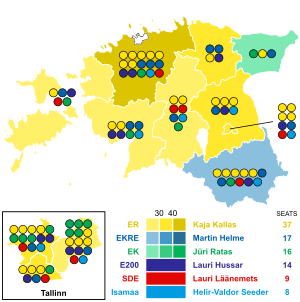
Back الانتخابات البرلمانية الإستونية 2023 Arabic Eleccions legislatives estonianes de 2023 Catalan Parlamentswahl in Estland 2023 German Elecciones parlamentarias de Estonia de 2023 Spanish 2023. aasta Riigikogu valimised Estonian انتخابات مجلس استونی ۲۰۲۳ Persian Riigikogun vaalit 2023 Finnish 2023. aastaga Riigikogo valimisõq FIU-VRO Élections législatives estoniennes de 2023 French Eleccións parlamentarias de Estonia de 2023 Galician
| |||||||||||||||||||||||||||||||||||||||||||||||||||||||||||||||||||||||||||||
All 101 seats in the Riigikogu 51 seats needed for a majority | |||||||||||||||||||||||||||||||||||||||||||||||||||||||||||||||||||||||||||||
|---|---|---|---|---|---|---|---|---|---|---|---|---|---|---|---|---|---|---|---|---|---|---|---|---|---|---|---|---|---|---|---|---|---|---|---|---|---|---|---|---|---|---|---|---|---|---|---|---|---|---|---|---|---|---|---|---|---|---|---|---|---|---|---|---|---|---|---|---|---|---|---|---|---|---|---|---|---|
| Opinion polls | |||||||||||||||||||||||||||||||||||||||||||||||||||||||||||||||||||||||||||||
| Turnout | 63.53% ( | ||||||||||||||||||||||||||||||||||||||||||||||||||||||||||||||||||||||||||||
| |||||||||||||||||||||||||||||||||||||||||||||||||||||||||||||||||||||||||||||
 Distribution of seats and the most voted-for party by constituency | |||||||||||||||||||||||||||||||||||||||||||||||||||||||||||||||||||||||||||||
| |||||||||||||||||||||||||||||||||||||||||||||||||||||||||||||||||||||||||||||
Parliamentary elections were held in Estonia on 5 March 2023 to elect all 101 members of the Riigikogu. The officially published election data indicate the victory of the Reform Party, which won 37 seats in total, while the Conservative People's Party of Estonia (EKRE) placed second with 17 seats. The Centre Party won 16 seats, a loss of 10, while Estonia 200 won 14 seats, gaining representation in the Riigikogu.
After the previous parliamentary election in 2019, the Centre Party, led by Jüri Ratas, formed a government with Ratas serving as prime minister. His government was brought down in January 2021 after a corruption investigation, and Kaja Kallas of the Reform Party formed a coalition government with the Centre Party, which collapsed in June 2022. Kallas then formed a government with Isamaa and the Social Democratic Party and remained in the position of prime minister.
In January 2023, the National Electoral Committee announced that nine political parties and ten individual candidates had registered to take part in the 2023 parliamentary election. During the campaign period, issues discussed most extensively regarded the Estonian economy, and the country's national defence and security due to the current Russian invasion of Ukraine. Individuals from contesting political parties also participated in multiple organised debates in January and February 2023. Voting at foreign embassies for Estonians outside the country took place from 18 to 23 February, while Estonian residents could vote during the pre-election period from 27 February to 4 March.
These were the first national elections where more than half of the votes were cast electronically over the Internet. Following the election, EKRE submitted an appeal to the Supreme Court of Estonia, requesting that the results be annulled and claiming that "anomalies and technical errors in the e-voting process had been observed", though the appeal was later dismissed. Reform successfully negotiated afterward with the Social Democratic Party and Estonia 200, forming a government headed by Kallas in April.
© MMXXIII Rich X Search. We shall prevail. All rights reserved. Rich X Search





